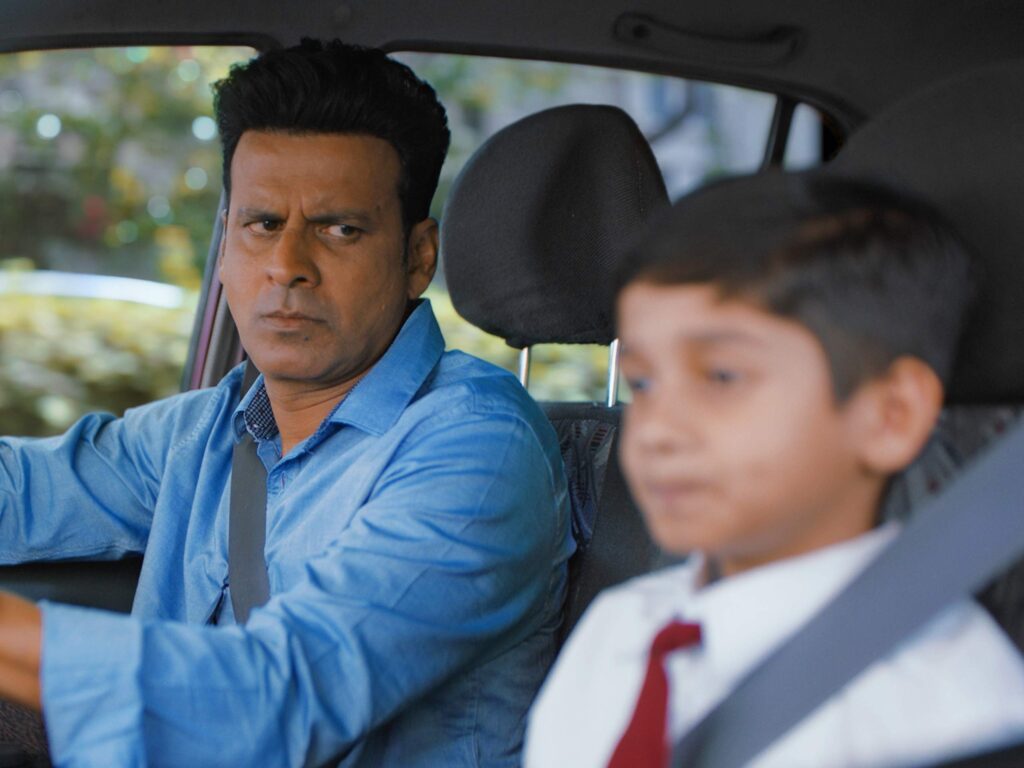Nationalism was the master key that pulled us out of colonial clutches into a sovereign, socialist and democratic republic seven decades back. Fifty years hence it was hyper-nationalism in cahoots with liberalization built around the demolition of a mosque that not only robbed us of sovereignty and socialism but also started shrinking the democratic space we had hard earned in past. It was a matter of time when this ‘hyper’ got reduced into ‘Hindutva’ and accepted as a new normal after 2014 with a MODI-fied dispensation at the center. In the last couple of years with cinemas closed and citizens locked inside their homes in fear of a deadly virus, we could easily see a cultural phenomenon unfolding on Indian OTT platforms that takes Hindutva Nationalism to a next level in a very subtle form.
It is more or less similar to the Cold War era, where mutual distrust and public fears of a possible hegemony of the ideological and cultural “Other”, had generated plots for anti-communist films, film noir, spy detectives, horrors and fantasies of a possible apocalypse. The bottom-line difference being that in Indian cinematography one cannot give away with “The Family”, the most pious and indivisible unit of this society.
Welcome to Season 2 of “The Family Man”- latest “Over the Top” nationalist cinema that has become the most watched original series on the Indian version of Amazon’s Prime Video service that is subscribed by 64% of households in India. After espionage-based web-series like “Bard of Blood”, “Kathmandu Connection”, “London Confidential”, “Special Ops” etc., the protagonist has come off age. He is neither divorced nor in recluse. He is living a family life with a couple of children and facing hiccups due to his professional commitments. So, the “family” seems to be a new trendsetting element in this genre which obviously catches eyeballs.
The Family
One cannot miss the irony in this web series nomenclature. The de-hyphenated relationship between the Man and the Family underlines the basic philosophy of a “Hindu” family i.e., Man is the provider and protector of his family- so be with him, whatever it takes! That is a departure from the mafiosi-styled Cicilian clan where Don Corleone (The Godfather) proclaims that real men are those who dine with their families and do not talk business on the eating table. That is not the Indian case. Here Shrikant Tiwari (Manoj Bajpeyi) finds himself sucked between table and trigger. He could opt for either of the one, so he leaves his spy job and starts working in an IT firm only to find himself later back on the spy job after all his love’s labor is lost to win back his wife. Eventually when his daughter is kidnapped in the midst of a mission and he extracts her out, the ‘family’ is sort of restored.

This evolution of the “spy” over time is inescapable. The OTT watching generation that comes from middle and upper-middle urban centers is not so overtly patriotic. It is essentially nationalist at heart but it loves a Hero that should be non-conformist- not like some Sunny Deol extracting a hand-pump out or a Sunil Shetty singing lousy love songs while being deployed at the border.
If the man has won back his family, the story must happily end now. It’s not the case here. Not because he was morally on a wrong path to save his family (Breaking Bad) or he broke the law (Point Blank). Tiwari’s morality is driven by his professional duties, he abides by the law and he has no visible crisis like Mr. Walter White (who had a cancer). The story should continue only because the immediate family here is a creative hedge to advance the cause of a larger family called ‘Nation’, that needs to be protected at any cost. For the action to continue, it needs to constantly re-invent the “Other”.
This “Other” is outside the family but constantly interrupts with the familial chores. Let us first have a look at our Man and his psyche that makes him the most suitable guy for believing in the “Other”.
The Man
Compared to the hard-line rustic patriotism in traditional Indian cinema like Gadar or LOC, what seems to be a quasi-patriotic persona in Shrikant Tiwari is the scriptwriter’s tactical approach to get him accepted among the audience as a mild guy who walks a tight rope while serving the nation and his loved ones. This evolution of the “spy” over time is inescapable. The OTT watching generation that comes from middle and upper-middle urban centers is not so overtly patriotic. It is essentially nationalist at heart but it loves a Hero that should be non-conformist- not like some Sunny Deol extracting a hand-pump out or a Sunil Shetty singing lousy love songs while being deployed at the border. That is an outdated stuff in 2021.
Now the character should be cool enough to kill (without remorse, as Tiwari terms it as orders from above), emotionally blackmail the “Other” (spinning fake personal stories like Tiwari) and to make breakfast as well. As Viktoria A. Sukovataya writes, “a kind of “true knight’’ being fed into the public mind; a hero without fear and beyond reproach, symbolizing the best masculine qualities: a valiant warrior, defender of the motherland” (Spy and Counterspy as a “Cultural Hero” in the Soviet Cinema of the Cold War). Most of the spy and espionage movies on Netflix and other platforms show protagonists of the very same qualities. The tradition of portraying such a spy has its roots in the Cold War era inspired first by Nikolai Kuznetsov, a Soviet spy-saboteur. It is not a co-incidence that the most representative Soviet detective film of the first post-war decade “Secret Agent” remained much popular among Soviet teenagers for decades.

Viktoria writes, “A Soviet spy under cover” Kuznetsov posed himself as an agent with many faces and names, but having a “true Aryan appearance”- blue eyes, blond hair and a straight nose, and mastering German language perfectly.” Compare this description with the North Indian Hindi-speaking agent Shrikant Tiwari, who has to search the meaning of English words (sham) on his mobile while talking to his South Indian wife or when he asks “what is Feminazi” to his daughter’s classmate. These comparatively lighter cinematic moments establish the image of a “true Hindustani Man” that has nothing to do with gender discourse or changing dynamics of teenage relationships.
When he tells his wife that “hamare yahan shadi hoti hai ya nahin hoti hai” in response to her demand for taking a time-off from marriage, he is defending all sorts of patriarchal repressions that take place in the guise of a pious Indian family. Without explicit reference to any ideological position, this character unknowingly becomes a mascot of RSS brand “one-ness” (like One Nation, One Tax, One Leader etc.) which goes by a Sanskrit phrase- “ekaih chaalakaanuvartitaah” (Driver is one and the only one). So much so that his wife could not dare to confess to her extra-marital affair till the very end of Season-2. The contrast played out by Tiwari’s wife and children is unmistakably remarkable here as it situates The Family Man Shrikant Tiwari on the other side of modernity (with all its values per se), who regards everything that is outside his comprehensibility as the “Other”!
Equating Kashmiri terrorists with Muslims and LTTE rebels with Tamils is an “over the top” strategy that seamlessly runs throughout both seasons of this series and tries to create a vicious circle of “anti-national forces”. It extrapolates to China in the next season. We should expect all sort of progressive, democratic, secular and intellectual left forces including North-East nationalities covered in “The Family Man: Season 3” inside the larger bracket of “anti-national’’!
The “Other”
Celebrity actress Radhika Apte who has worked in A Call To Spy (Netflix) clearly speaks of excessive nationalist attitude in Indian films when she says,
“In India, it is a delicate subject, let’s say. But yes, all of them are quite nationalistic and we have a long way to go in that regard. How do we look at war on that front is very essential. It worries me sometimes because literally we have cricket and cinema, two most influential forms. And if this is how we start looking at our neighboring countries and war, it’s a bit concerning.”
In the first season of The Family Man it was Kashmir (and Muslims), the latest “Other” is LTTE (and Tamils) and the next one is China, as the teaser shows.
The upcoming China plot co-incidentally resonates with the larger narrative of the ongoing pandemic (talks of COV-SARS-2 virus manufactured in a Wuhan lab)! Already this season has created tensions and outrage inside the Tamil community which finds itself superficially portrayed to the point of being guilty of an ex-PM’s assassination. Equating Kashmiri terrorists with Muslims and LTTE rebels with Tamils is an “over the top” strategy that seamlessly runs throughout both seasons of this series and tries to create a vicious circle of “anti-national forces”. It extrapolates to China in the next season. We should expect all sort of progressive, democratic, secular and intellectual left forces including North-East nationalities covered in “The Family Man: Season 3” inside the larger bracket of “anti-national’’!
Referring to Apte, it is not only a question of looking at the neighbors but dealing with our nationalities and sub-nationalities too. For example, the Tamil nationality- that has a long history of anti-Hindi movement in India- has been a competing nationalist force against Sinhalese nationalism in Sri Lanka. Although the war was over after Prabhakaran’s reported death and announcement that “We have decided to silence our guns. Our only regrets are for the lives lost and that we could not hold out for longer” by Selvarasa Pathmanathan, the Tigers’ chief of international relations. But sentiments are still there as Sinhalese and Tamil nationalisms have taken a rejuvenated form after the end of the civil strife. Tamil nationalism is dispersed across a globalized movement. Any generalization and factual mis-portrayal of this movement may have geo-political and domestic consequences.

In the series, the episode where a police station in Tamilnadu is attacked by LTTE sympathisers and the threat of internal resistance (during search operation for Raji) raises questions regarding the need to villainize a large section of population in the mainstream cinema. Moreover, the OTT watching young audience has no historical connect with the complexities that lie in the LTTE episode and role of the then Indian government in first brewing it and then sending Peace Keeping Forces that was alleged to have committed atrocities over Eelam Tamils. After all it was a political movement and not something of a personal vendetta as shown in the series. The suicide of Bhaskaran (resembling Prabhakaran) is also factually incorrect and the relations of LTTE with ISI and other aspects remain allegations at large.
Over the Top
Hindutva Nationalism is gradually failing in its vocabulary and slogans among urban centers that are now witness to a huge unemployment and falling incomes after two spells of Lockdown. The recent loss of BJP in West Bengal assembly elections and poor performance in Uttar Pradesh Panchayat polls have shown that the basic issues of social security, employment and economy are taking front seat now. BJP needs to take hold of this situation. It has actually no contenders as far as cultural messaging is concerned. It just needed the right eco-system to do that.
Not missing the long-drawn controversial episode after Sushant Singh’s death, when some rational Bollywood voices were vilified by Narcotics and pressurized one after another, we could easily grasp the political context and situation in which cinema is being produced in Mumbai. Political control over Bollywood and its affairs was a much sought-after project in BJP’s gameplan. It could not be possible with Shiv Sena still being its ally. Ever since the political equation changed and Shiv Sena formed government with Congress in Maharashtra, BJP went all out to chase the “Others”. This has created huge pressure on producers and directors.
The hidden message to filmmakers is clear- either toe the line or you are doomed! This is OTT Nationalism. What we witness today in The Family Man is just tip of the iceberg- a soft cultural poison being injected inside that amuses outside. Aren’t we missing woods for the trees?
(Abhishek Srivastava is a UP based independent writer, translator and journalist who moderates community platform Junputh)



























